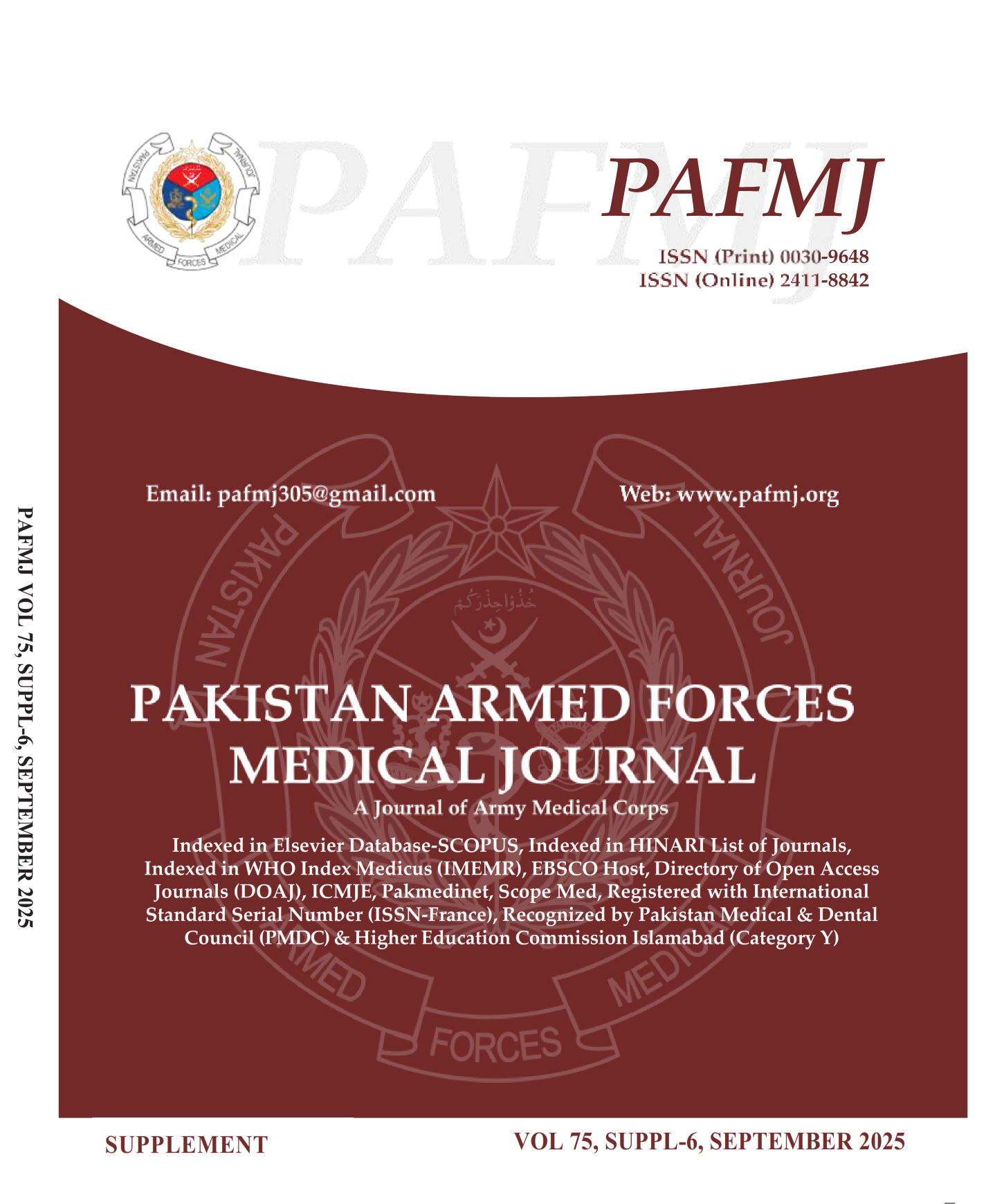The Outcome of Pregnancy in Women with Normal V/S High Salt Intake Presenting in a Hospital of Northern Region of Pakistan
DOI:
https://doi.org/10.51253/pafmj.v75iSUPPL-6.12871Keywords:
Fetal growth retardation; Infant; Pregnancy; Sodium Chloride; Preeclampsia; OligohydramniosAbstract
Objective: To compare the outcome of pregnancy in women with normal versus high salt intake presenting in a hospital of northern region Pakistan.
study design: quasi experimental study.
Place and Duration of Study: Department of Gynecology and Obstetrics, Combined Military Hospital, Gilgit Pakistan, from Feb 2023 to Feb 2024.
Methodology: This study was conducted on the pregnant women attending the department for antenatal checkup in these study dates. Daily salt intake was calculated with the help of dietician by calculating the overall consumption of sodium chloride in different forms during the day. Women were divided into two groups on this basis as having normal or high salt intake. Both the groups were followed up till the time of delivery for any maternal or fetal complications.
Results: A total of 1000 pregnant women were included in the final analysis who were followed up till delivery. Mean age of the study participants was 26.66±5.15 years. Out of the babies born, 527(52.7%) were males and 473(47.3%) were females. Out of 1000 women, 450(45%) were classed as having normal salt intake while 550(55%) were classed as having high salt intake. Statistical analysis showed that intrauterine growth retardation, oligohydramnios, pregnancy induced hypertension and preeclampsia were found significantly more in women who had high salt intake (p-value<0.01).
Conclusion: A significant number of pregnant women in Gilgit and surrounding areas were having high salt intake. Both maternal and fetal complications studies were found significantly more in women with high salt intake as compared to women with ...
Downloads
References
1. Aziz A, Saleem S, Nolen TL, Pradhan NA, McClure EM, Jessani S et al. Why are the Pakistani maternal, fetal and newborn outcomes so poor compared to other low and middle-income countries? Reprod Health 2020; 17(Suppl 3): 190.
https://doi.org/10.1186/s12978-020-01023-5
2. WH, Leghari AL, Hussain AS, Ariff S, Khan IA. Frequency and Early Complications of Late Preterm Infants: A Descriptive Analysis from Two Secondary-care Hospitals of Karachi. Cureus 2019; 11(9): e5789.
https://doi.org/10.7759/cureus.5789
3. Karnati S, Kollikonda S, Abu-Shaweesh J. Late preterm infants - Changing trends and continuing challenges. Int J Pediatr Adolesc Med 2020; 7(1): 36-44.
https://doi.org/10.1016/j.ijpam.2020.02.006
4. Salman M, Rathore H, Arif S, Ali R, Khan AA, Nasir M. Frequency of Immediate Neonatal Complications (Hypoglycemia and Neonatal Jaundice) in Late Preterm and Term Neonates. Cureus 2021; 13(1): e12512.
https://doi.org/10.7759/cureus.12512
5. Arvizu M, Bjerregaard AA, Madsen MTB, Granström C, Halldorsson TI, Olsen SF, et al. Sodium Intake during Pregnancy, but Not Other Diet Recommendations Aimed at Preventing Cardiovascular Disease, Is Positively Related to Risk of Hypertensive Disorders of Pregnancy. J Nutr 2020; 150(1): 159-166.
https://doi.org/ 10.1093/jn/nxz197
6. Ferdaus SI, Kohno K, Hamano T, Takeda M, Yamasaki M, Isomura M et al. Altitudes of residential areas affect salt intake in a rural area in Japan: a Shimane CoHRE Study. Hypertens Res 2015; 38(12): 895-898.
https://doi.org/10.1038/hr.2015.91
7. Maldonado LE, Bastain TM, Toledo-Corral CM, Dunton GF, Habre R, Eckel SP, et al. Maternal Dietary Patterns During Pregnancy Are Linked to Hypertensive Disorders of Pregnancy Among a Predominantly Low-Income US Hispanic/Latina Pregnancy Cohort. J Am Heart Assoc 2024; 13(5): e029848.
https://doi.org/ 10.1161/JAHA.123.029848
8. Reynolds CM, Vickers MH, Harrison CJ, Segovia SA, Gray C. High fat and/or high salt intake during pregnancy alters maternal meta-inflammation and offspring growth and metabolic profiles. Physiol Rep 2014; 2(8): e12110.
https://doi.org/ 10.14814/phy2.12110
9. Duley L, Henderson-Smart D. Reduced salt intake compared to normal dietary salt, or high intake, in pregnancy. Cochrane Database Syst Rev 2000; 1999(2): CD001687.
https://doi.org/10.1002/14651858.CD001687
10. Tharwani ZH, Bilal W, Khan HA, Kumar P, Butt MS, Hamdana AH, et al. Infant & Child Mortality in Pakistan and its Determinants: A Review. Inquiry 2023; 60(3): 469580231167024.
https://doi.org/ 10.1177/00469580231167024
11. Li T, Wang Z, Xiao Z, Feng C, Sun Z, Mao D, et al. Associations of Cooking Salt Intake During Pregnancy with Low Birth Weight and Small for Gestational Age Newborns: A Large Cohort Study. Nutrients 2025; 17(4): 642.
https://doi.org/10.3390/nu17040642
12. Bhattacharya S, Bera OP, Saleem SM, Hossain MM, Varshney DS, Kaur R, et al. Dietary salt consumption pattern as an antecedent risk factor for hypertension: Status, vision, and future recommendations. Clin Nutr ESPEN 2022; 47(3): 422-430. https://doi.org/10.1016/j.clnesp.2021.12.006
13. Mohammed SS, Ahmed AA. Prevalence Rate, Probable Causes, and Perinatal Outcomes in Women With Oligohydramnios in Labor. Cureus 2024; 16(5): e61290.
https://doi.org/10.7759/cureus.61290
14. Bajpai D, Popa C, Verma P, Dumanski S, Shah S. Evaluation and Management of Hypertensive Disorders of Pregnancy. Kidney360 2023; 4(10): 1512-1525.
https://doi.org/ 10.34067/KID.0000000000000228
15. Seo Y, Jeong YS, Koo KA, Yang JI, Park YK. Maternal nutrition intervention focused on the adjustment of salt and sugar intake can improve pregnancy outcomes. Food Sci Nutr 2020; 8(7): 3900-3911. https://doi.org/10.1002/fsn3.1699
16. Mayer-Davis E, Leidy H, Mattes R, Naimi T, Novotny R, Schneeman B, et al. Beverage Consumption During Pregnancy and Birth Weight: A Systematic Review [Internet]. Alexandria (VA): USDA Nutrition Evidence Systematic Review; 2020 Jul. PMID: 35349234.
https://doi.org/10.52570/NESR.DGAC2020.SR0402
17. Imanpour V, Khoshhali M, Goodarzi-Khoigani M, Kelishadi R. Systematic review and meta-analysis of nutritional interventions to prevent of gestational hypertension or/and preeclampsia among healthy pregnant women. J Res Med Sci 2023; 28(3): 25. https://doi.org/10.4103/jrms.jrms_89_22
18. Mao C, Liu R, Bo L, Chen N, Li S, Xia S, et al. High-salt diets during pregnancy affected fetal and offspring renal renin-angiotensin system. J Endocrinol 2013; 218(1): 61-73.
Downloads
Published
License
Copyright (c) 2025 Reema Gul, Ayisha Raja, Munnaza Andleeb, Faria Memon, Fareeha Zaheer, Umber Imtiaz Khan

This work is licensed under a Creative Commons Attribution-NonCommercial 4.0 International License.















